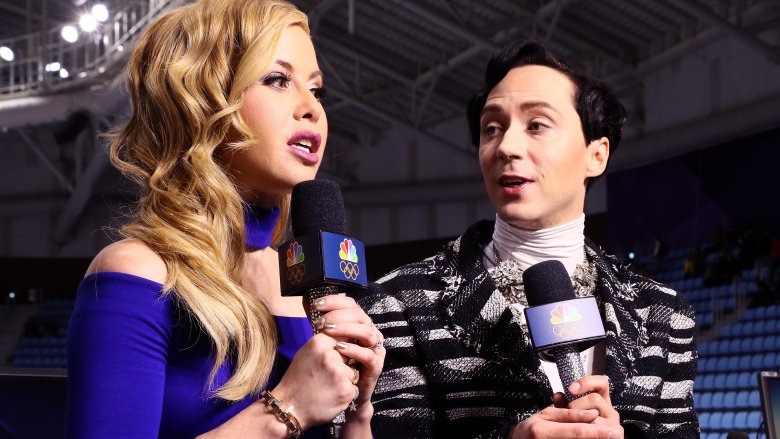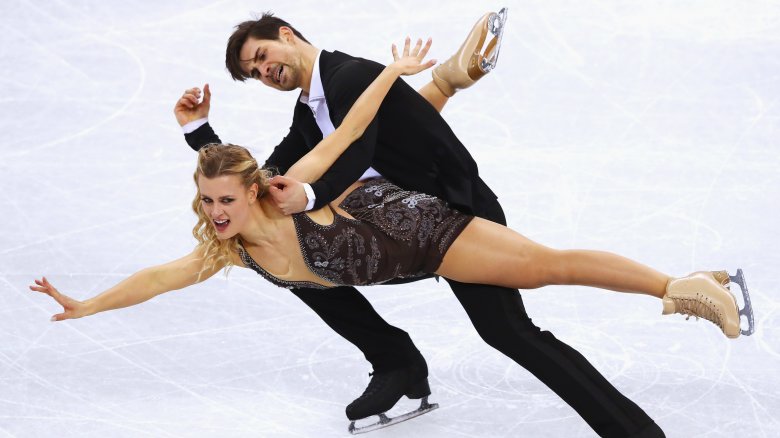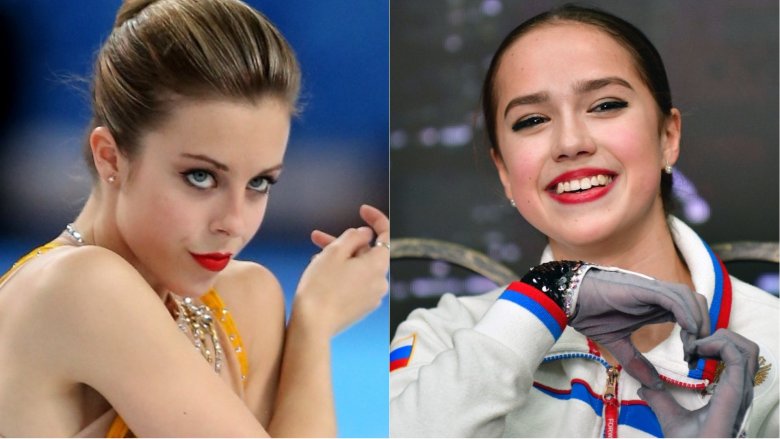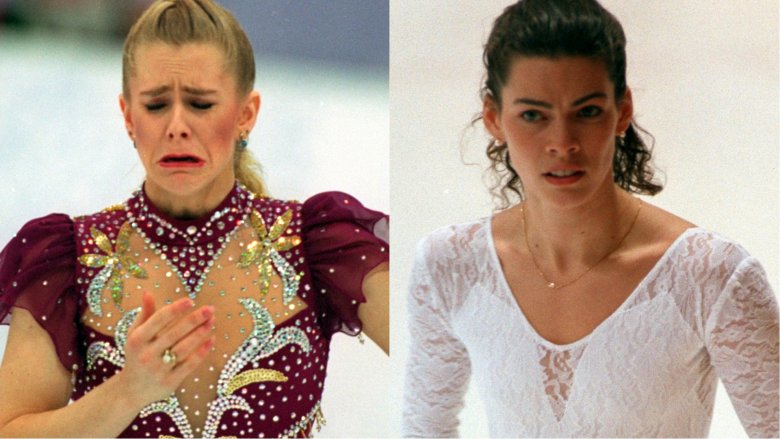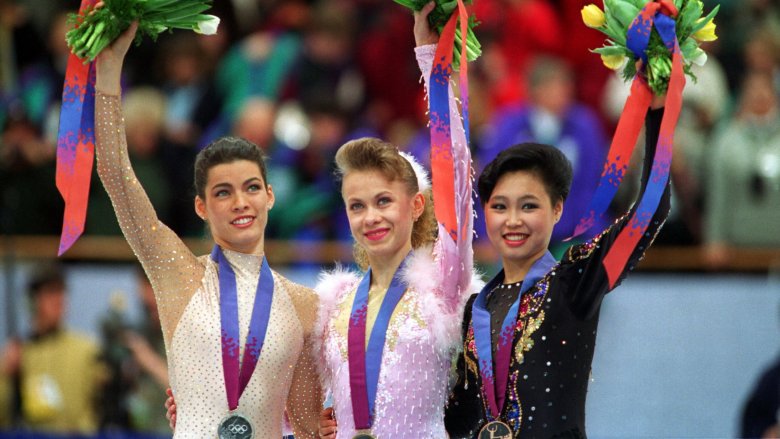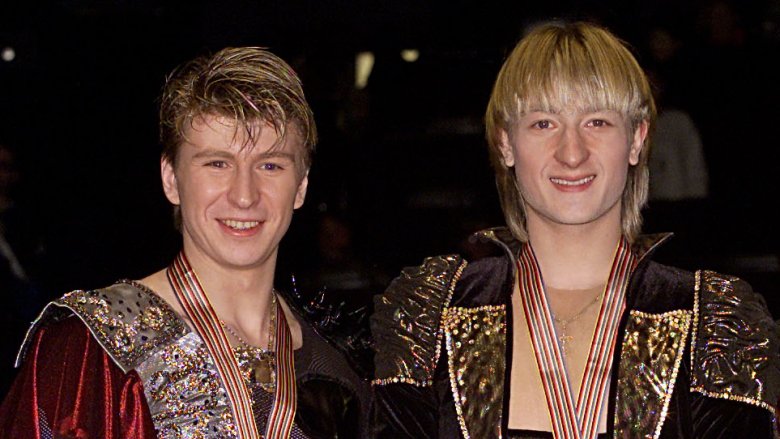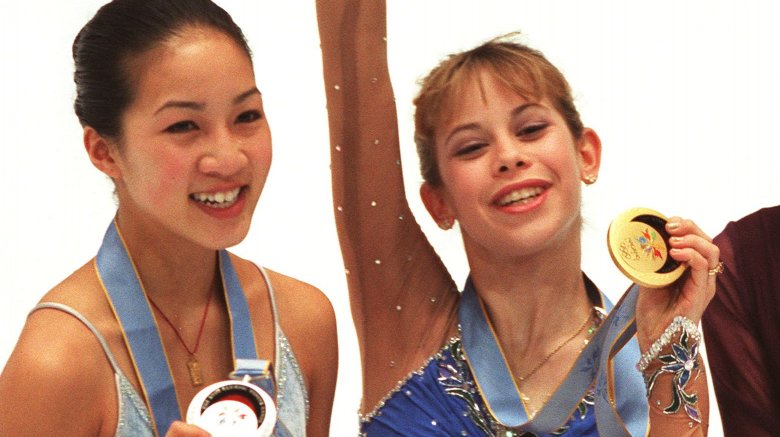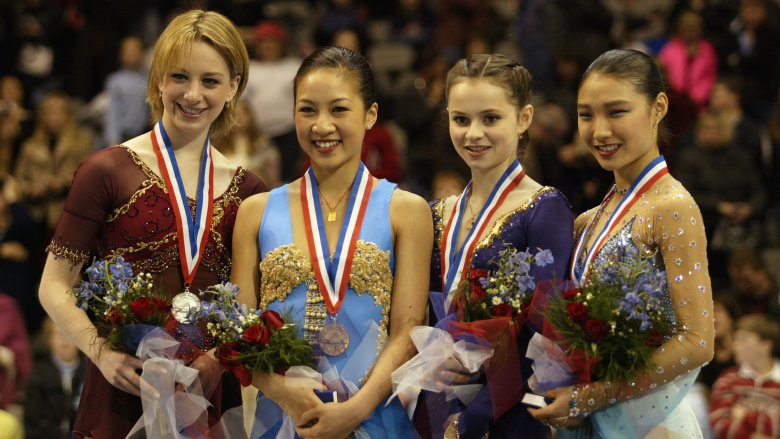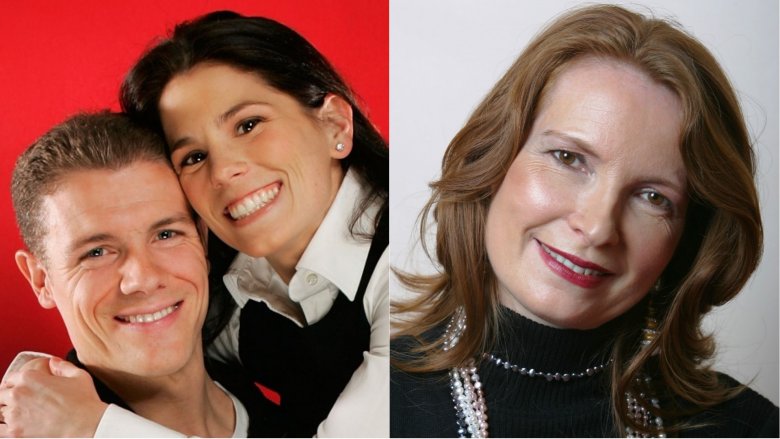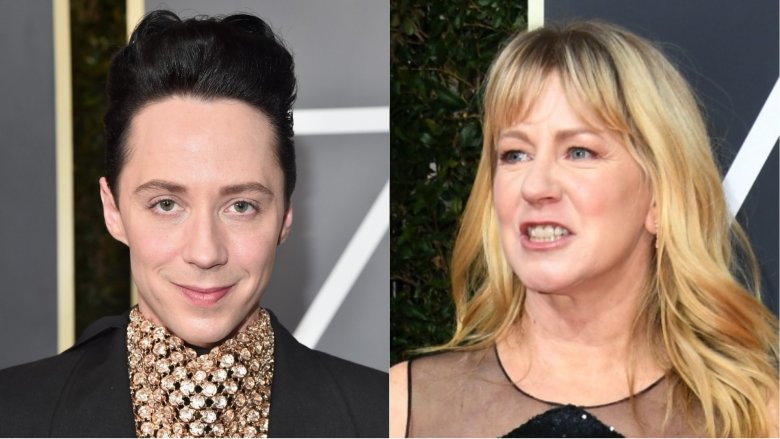Nasty Behind The Scenes Feuds Of Figure Skating
Out of all the Olympic sports — winter and summer games included — there is one that has always stood apart for its drama and controversy: figure skating. With its complicated scoring system, history of scandals, and relatively small competitive field, it's easy for intense rivalries to emerge.
While most of the rivalries were just that — highly competitive athletes looking to best each other on the ice — some of them took an ugly spin into personal enmity. These skating skirmishes run the gamut from shading each other in the press to physical assaults. Let's take a peek outside the rink for some of the nastiest feuds of figure skating.
Fire & Ice
Though ice dancers Madison Hubbell and Zachary Donohue ended their 2018 Olympic debut with a disappointing fourth place finish, they have already triumphed in a different way by overcoming an intense athletic rivalry and a broken romantic relationship.
Hubbell spoke to People about their unlikely start as an ice dancing pair in 2011. "We were both competitors against each other and we hated each other," she said. "Our mutual coach at the time kind of forced us to start skating together just to kill time. We didn't really want to skate together. It was fate." Somehow, the pair managed to make it work on — and off — the ice.
"It's not that uncommon for partners to date or at least have some attraction as you can imagine," she told the Hartford Courant. Right, but it is sort of unusual when you start out absolutely hating each other. Anyway, Donohue and Hubbell became not only a great skating pair, but also wonderful supporters for each other in every way, even after their two-year romantic relationship came to an end.
"I'm lucky enough to have possibly the best female figure skater in this generation by my side," Donohue told the Hartford Courant in February 2018. Hubbell added, "He's been very loyal and I can be open with him. I'm not afraid to tell him of my deepest, darkest secrets and know that he's going to be there no matter what."
Seriously, are these two just a real life The Cutting Edge, or what?
'It's not a performance'
This feud involves another outspoken former member of the U.S. Olympic figure skating team who isn't afraid to call it as she sees it. Ashley Wagner, the bronze medalist who made her Olympic debut in Sochi in 2014, didn't make the cut for 2018, but that hasn't stopped her from offering a colorful running commentary of the games on Twitter, especially in regards to 15-year-old Russian figure skating phenom Alina Zagitova.
Zagitova, who won the individual gold medal at the 2018 Games has stirred up some controversy for the way she backloads her program — executing all her jumps in the second half of the program to earn bonus points, according to USA Today Sports.
This does not sit well with Wagner, who views Zagitova's strategy as a respectable "competitive approach," but feels that it's not in keeping with the spirit of the sport. "It's not a program," Wagner tweeted. "She killed time in the beginning and then just jumped the second half. It's not a performance. I understand that this is what the system allows but it's not all figure skating is about."
According to the admittedly dubious Russian "news" site, Sputnik News, Zagitova has "clapped back" at Wagner, saying, "I don't agree with Ashley Wagner's opinion of my routine. I have a balanced program: downbeat music at the start, and going upbeat gradually. All of my jumps go along with the music." Yep, that sounds exactly like the calm, measured way in which 15-year-olds engage in catty disputes.
The whack heard round the world
This battle began in 1991 when Tonya Harding bested Nancy Kerrigan at the U.S. Figure Skating Championships with a performance that included a historic triple axel. Though arguably the more technically superior skater, Harding never matched the star power of Kerrigan, who landed lucrative endorsement deals and quickly became America's sweetheart, according to Marie Claire.
Three years later, and just six weeks ahead of the 1994 Winter Olympics in Lillehammer, Harding and Kerrigan were in Detroit preparing for the U.S. National Championships and hoping to land a spot on Team USA. That's when Kerrigan was attacked following a practice session by a baton-wielding mystery man who bashed her knee. The injury took Kerrigan out of the competition.
Kerrigan recovered from the attack and both women made the Olympic squad, although they delivered starkly different performances at the Games. Harding suffered the infamous "broken lace" incident, finishing in eighth place, while Kerrigan stunned and clinched the silver.
As for the infamous whack. The whole thing was determined to be a plot by Harding's ex-husband, Jeff Gillooly; his friend, Shawn Eckhart; the attacker, Shane Stant; and possibly Harding herself. She has long denied any advance knowledge of the attack, though Harding did eventually plead guilty to "conspiring to hinder prosecution" by aiding in a cover-up.
Kerrigan hasn't said much on the subject in recent years, except that she never got a "direct" apology. Harding has been more outspoken. "Enough apologizing," she said during the 2018 ABC News special, Truth and Lies: The Tonya Harding Story (via USA Today Sports) "She has her life. I have my life. We both have wonderful lives. That should be all that matters."
America's sweetheart gets a little salty
Though Nancy Kerrigan had been painted as figure skating's darling, her image took a bit of a hit when she seemed to shade Ukranian Oksana Baiul's tearful joy at winning the gold in Lillehammer in 1994.
In a video clip that went viral before going viral was even a thing, Kerrigan is overheard becoming impatient while waiting for Baiul to return to the ice for the medal ceremony. Kerrigan, who won the silver, says, "Oh, come on. So, she's gonna get out here and cry again."
The backlash against Kerrigan was severe, prompting a response from Kerrigan, who said, "I was afraid the crowd was losing its enthusiasm and was starting to leave. It was not meant as a slight toward Oksana," according to the Independent. (It sure didn't look or sound that way on camera, Nancy.)
By the way, that infamous delay was partially prompted by a frantic search for the Ukranian national anthem. To make matters worse, Baiul later revealed that her emotions weren't so much about winning the gold as they were about just making it through the performance, which she dedicated to her mother, who had died of ovarian cancer. Talk about adding an embarrassing Mean Girls sheen to what already looked like downright pettiness. As far as we can tell, Baiul never specifically addressed Kerrigan's comments, but honestly, did she really have to?
Lifelong frenemies
Russian skaters Alexei Yagudin (above left) and Evgeni Plushenko (above right) grew up competing against one another. Earning World Junior Championship titles at 16 and 14-years old, respectively, Yagudin and Plushenko spent their entire amateur careers jockeying for the top podium position in a field where they were far and away the frontrunners. But they were definitely not BFFs.
Yagudin made that very clear in a 2002 ESPN interview when he said, "Plushenko and I are not friends. It's a huge fight at every event." He added that the animosity extended beyond just the two skaters, alleging that his then coach, Tatiana Tarasova, and his former coach, who also happened to be Plushenko's coach, Alexei Mishin, often clashed as well.
Years later, Yagudin softened his stance a bit, telling Absolute Skating in 2011, "It was always made by the media. We never hated each other. We were not friends, that's true, but we weren't enemies. We can talk to each other and we are fine, but we are never going to call each other and ask 'How are you.'"
The notoriously fiery Plushenko also echoed Yagudin's sentiments in a 2013 interview with a Russian radio station (via Golden Skate) in which he wished Yagudin a happy birthday and described him as an "outstanding athlete" who was his "only one real 'enemy' on ice, but not off ice."
So, if Madison Hubbell and Zach Donohue are the characters from The Cutting Edge, does that make Yagudin and Plushenko the real-life inspiration for Chazz Michael Michaels and Jimmy MacElroy?
Doth Michelle protest too much?
In 1998, with Tonya Harding and Nancy Kerrigan both retired from competitive skating, the drama factory surrounding the sport needed fresh blood. Enter Michelle Kwan and Tara Lipinski, the then-teenage wunderkinds who dominated Nagano by taking home the silver and gold, respectively, for Team USA.
Of course, none of that could happen without drama, right? Well, sort of. According to the New York Daily News, Lipinski once said at a press conference, "The only thing Michelle and I have in common is we're both after the same thing, a gold medal," before being quickly whisked away from reporters by her handlers. However, no other outlets picked up the quote, and, as far as we can tell, there was no other overt fighting reported between these two.
In fact, Kwan later told Forbes in a 2017 interview that she never feuded with any of her competitors, Lipinski included. "The media seemed to play up a rivalry that existed and did not exist. ... I always found it interesting — but I never felt that way. If you ask another competitor, they may tell you they felt very competitive towards me. But I can tell you that my biggest competition was myself."
So there you have it, folks, the media was just creating narratives out of thin air about the highly competitive nature of super athletes who train their entire lives to vie for a single championship spot that only comes around every four years. You believe that, right?
Seriously, a parking spot?
This one is a quick little anecdote and doesn't remotely level up to feud status, but we found it so funny that we had to include it. In 2002, The New York Times reported that "feisty skater" Sasha Cohen "swiped Sarah Hughes's parking spot" at the U.S. Figure Skating Championships and "did not even honk her horn." Oh, the drama!
Granted, by this time Cohen had established herself as headstrong and unpredictable, bouncing from one coach to the next when their ideologies clashed, according to the Chicago Tribune. Even so, we'll admit that even subtly suggesting that something as fleeting as a parking lot dispute could legitimize animosity between Cohen (second from right) and Hughes (far left) is a big stretch, not to mention something that we would have expected from a gossip rag rather than the self-proclaimed "newspaper of record."
Wait, this sort of pokes a hole in our prior suggestion that the media doesn't blow these little power struggles out of proportion, doesn't it? Ugh, figure skating, why are you such a mystery?
It's not just the skaters
The biggest scandal to come out of the figure skating world since Harding vs. Kerrigan has to be during the 2002 Winter Games in Salt Lake City when Russian pairs figure skaters Yelena Berezhnaya and Anton Sikharulidze edged out the Canadian duo of Jamie Sale and David Pelletier for the gold. The decision was widely viewed as controversial, and allegations of a "vote-swapping deal" soon emerged, with French and Russian judges supposedly colluding with each other, according to the BBC.
Ultimately, it was French judge Marie-Reine Le Gougne and Didier Gailhaguet, president of the French Federation of Ice Sports, who went down for the scheme, each receiving a three-year ban from the sport, as well as a ban from the 2006 Olympics in Turin.
As of January 2018, Le Gougne still maintains her innocence, insisting to Reuters that the Russians performance "was much superior to that of the Canadians" due to its "technical density" and "complexity." She even said that she was so distraught over the scandal that she "simply didn't want to live anymore."
Sale and Pelletier eventually received a "duplicate gold medal to share with the Russian pair," but that token was bittersweet. Sale told Reuters that she does not believe Le Gougne's remarks about the scandal, calling her "not credible." Pelletier spoke about being "robbed" of the moment. "If you receive a medal a year, six months or five days later, the emotion is gone," he said. "It's emotional, of course, but it's not the same."
And yes, we recognize that this was not a dispute between skaters, but we felt it was important to point out that in the shady behind-the-scenes world of figure skating, literally anyone can play the villain.
Bye, Tonya
The 2017 film I, Tonya was nothing short of controversial. The mockumentary style biopic, told from the perspective of Harding, her family, and the key players in her skating career, has been both heralded by critics and shamed by others who feel that it strikes an inappropriate tone toward someone who allegedly helped perpetrate a vicious attack on a competitor.
One of the film's biggest detractors is former Olympian and figure skating commentator Johnny Weir, who told WWD that he would not watch the film because it would be "disrespectful" to his "dear friend" Kerrigan. Referring to Harding as a "villain" in the world of figure skating, Weir also said, "What separated [Harding and Kerrigan] was a good person versus a bad person. I don't think it's right for Hollywood to accept Tonya Harding. I know that Tonya tried to shed some light on the situation but at the end of the day, Tonya Harding did a terrible thing and I don't want to support it."
As of this writing, Harding hasn't responded to Weir's specific criticisms, but she has said that what she loves about the film is that it's not supposed to be about exoneration, but rather, offering her truth about her troubling life as context for the 1994 attack that has haunted her ever since. Speaking about her relationship with the press, Harding told The New York Times, "You all disrespected me and it hurt. I'm a human being and it hurt my heart. I was a liar to everybody but still, 23 years later, finally everybody can just eat crow. That's what I have to say."

